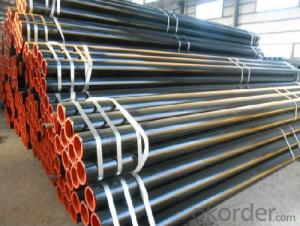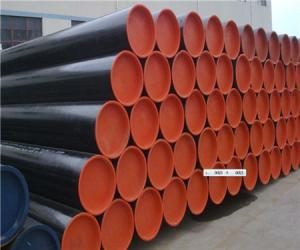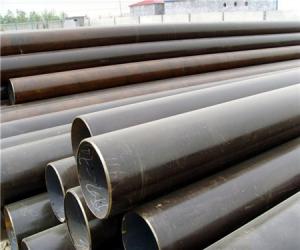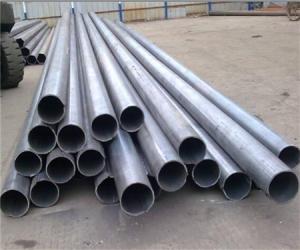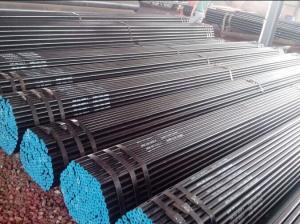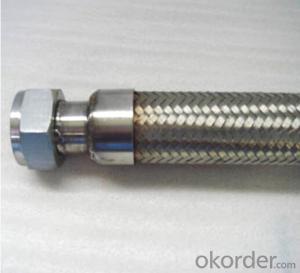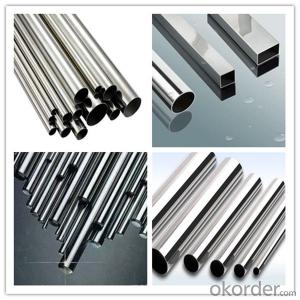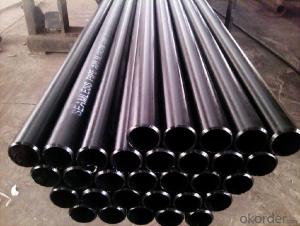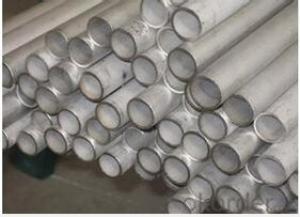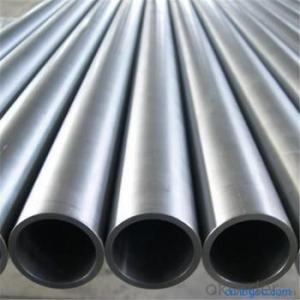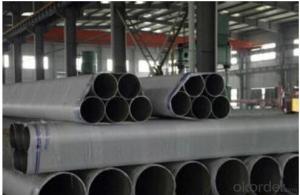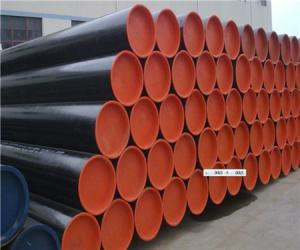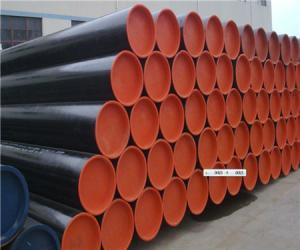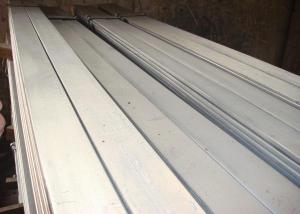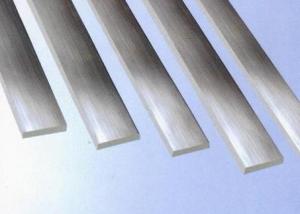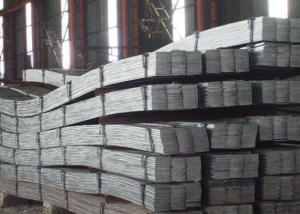Seamless Stainless Steel Pipe S31803 China Factory
- Loading Port:
- China Main Port
- Payment Terms:
- TT or LC
- Min Order Qty:
- 30 m.t.
- Supply Capability:
- 12000 m.t./month
OKorder Service Pledge
OKorder Financial Service
You Might Also Like
1、Structure of Seamless Pipe ASTM A106/53:
1.duplex S31803 stainless steel seamless pipe
2.OD:3-580MM WT:1-30MM
3.ASTM A240/789/790
4.chemical industry pipe
5.Zhejiang
2、Main Features of the Seamless Pipe ASTM A106/53:
• High manufacturing accuracy
• High strength
• Small inertia resistance
• Strong heat dissipation ability
• Good visual effect
• Reasonable price
3、Seamless Pipe ASTM A106/53 Specification:
Standard | GB, DIN, ASTM ASTM A106-2006, ASTM A53-2007 |
Grade | 10#-45#, 16Mn 10#, 20#, 45#, 16Mn |
Thickness | 8 - 33 mm |
Section Shape | Round |
Outer Diameter | 133 - 219 mm |
Place of Origin | Shandong, China (Mainland) |
Secondary Or Not | Non-secondary |
Application | Hydraulic Pipe |
Technique | Cold Drawn |
Certification | API |
Surface Treatment | factory state or painted black |
Special Pipe | API Pipe |
Alloy Or Not | Non-alloy |
Length | 5-12M |
Outer Diameter | 21.3-610mm |
Grade | 20#, 45#, Q345, API J55, API K55, API L80, API N80, API P110, A53B |
Standard | ASME, ASTM |
4、Packaging & Delivery
Packaging Details: | seaworthy package,bundles wrapped with strong steel strip |
Delivery Detail: | 15-30days after received 30%TT |
5、FAQ of Seamless Pipe ASTM A106/53:
①How is the quality of your products?
Our products are manufactured strictly according to national and internaional standard, and we take a test
on every pipe before delivered out. If you want see our quality certifications and all kinds of testing report, please just ask us for it.
Guaranteed: If products’ quality don’t accord to discription as we give or the promise before you place order, we promise 100% refund.
②How about price?
Yes, we are factory and be able to give you lowest price below market one, and we have a policy that “ for saving time and absolutely honest business attitude, we quote as lowest as possible for any customer, and discount can be given according to quantity”,if you like bargain and factory price is not low enough as you think, just don’t waste your time.Please trust the quotation we would give you, it is professional one.
③Why should you chose us?
Chose happens because of quality, then price, We can give you both.Additionally, we can also offer professional products inquiry, products knowledge train(for agents), smooth goods delivery, exellent customer solution proposals.Our service formula: good quality+good price+good service=customer’s trust
SGS test is available, customer inspection before shipping is welcome, third party inspection is no problem.
6、Seamless Pipe ASTM A106/53 Images:
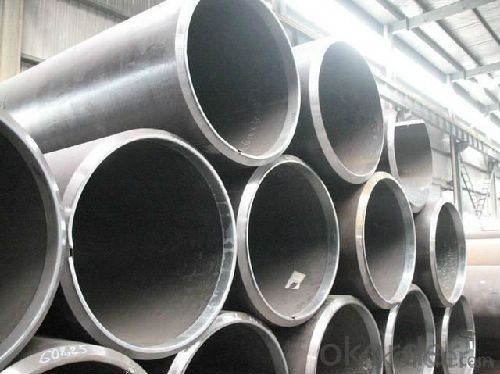
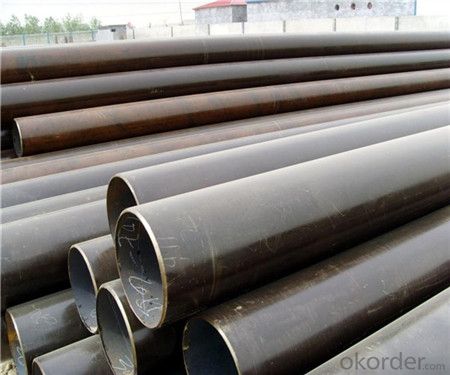
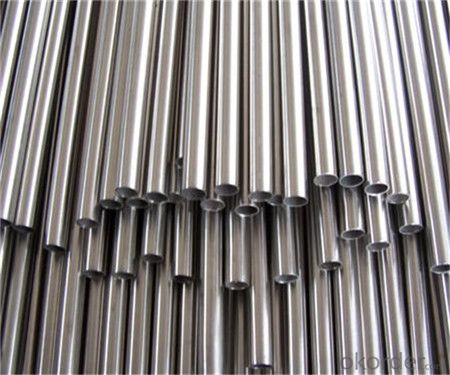
- Q: Can stainless steel pipes be used for steam piping?
- Yes, stainless steel pipes can be used for steam piping. Stainless steel is highly resistant to corrosion and can withstand high temperatures, making it an excellent choice for steam applications where durability and longevity are important.
- Q: Can stainless steel pipes be used for underground sewage systems?
- Certainly! Underground sewage systems can indeed utilize stainless steel pipes. Due to its exceptional durability and resistance to corrosion, stainless steel is an ideal material for underground applications that frequently encounter moisture and chemicals. It can effectively endure the demanding conditions of sewage systems, including the erosive properties of wastewater and the pressure exerted by the soil. Moreover, stainless steel pipes boast an extensive lifespan, minimizing the necessity for frequent replacements and upkeep. Nevertheless, it is crucial to carefully assess the unique prerequisites and regulations of the local sewage system, and seek advice from experts to guarantee appropriate installation and compatibility with other system components.
- Q: What is the maximum length of stainless steel pipes available?
- The maximum length of stainless steel pipes available varies depending on the manufacturer and specific product. However, commonly, stainless steel pipes can be found in lengths ranging from 20 feet to 40 feet.
- Q: Can stainless steel pipes be used for drinking water systems?
- Yes, stainless steel pipes can be used for drinking water systems. Stainless steel is a highly durable and corrosion-resistant material, making it suitable for use in plumbing systems. It is also non-reactive, which means it does not leach harmful chemicals into the water. Additionally, stainless steel pipes are easy to clean and maintain, reducing the risk of bacterial growth and ensuring the safety and quality of the drinking water.
- Q: Stainless steel pipe is mainly used in what areas?
- According to the use of stainless steel pipe can be divided into oil well pipe (casing, tubing and drill pipe etc.), line pipe, boiler tube, mechanical structure, hydraulic prop pipe pipe, cylinder pipe, geological pipe, chemical pipe (high pressure fertilizer pipe, oil cracking tube) and shipbuilding pipe etc..
- Q: Can stainless steel pipes be used for wastewater treatment plants?
- Certainly! Wastewater treatment plants can utilize stainless steel pipes. Stainless steel, being remarkably durable and resistant to corrosion, proves to be an excellent selection for use in challenging settings like wastewater treatment plants. Its corrosion resistance aids in averting leaks and reducing the need for maintenance, thereby guaranteeing extended pipe longevity. Moreover, stainless steel pipes are sanitary and effortless to clean, a critical aspect in wastewater treatment plants where cleanliness and sanitation are paramount. All in all, stainless steel pipes offer a dependable and effective means of transporting wastewater within treatment plants.
- Q: How do you calculate the flow velocity in stainless steel pipes?
- The flow velocity in stainless steel pipes can be calculated using the equation Q = A * V, where Q represents the flow rate, A is the cross-sectional area of the pipe, and V is the flow velocity. By rearranging the equation to solve for V, we can calculate the flow velocity as V = Q / A.
- Q: What is the difference between 321 and 321H stainless steel pipes?
- The carbon content and resulting mechanical properties are what distinguish 321 stainless steel pipes from 321H stainless steel pipes. Both grades are stabilized austenitic stainless steels with titanium as the stabilizing element. However, 321H contains a higher carbon content compared to 321. The higher carbon content in 321H contributes to enhanced strength at high temperatures and resistance to creep. This makes 321H ideal for applications involving elevated temperatures, such as the production of heat exchangers, furnace components, and other high-temperature equipment. On the contrary, 321 stainless steel pipes are commonly utilized in situations where exposure to high temperatures is not necessary. They possess excellent resistance to intergranular corrosion and are frequently employed in the aerospace industry, as well as in the manufacturing of exhaust systems, chemical processing equipment, and other versatile applications. To summarize, the distinction between 321 and 321H stainless steel pipes lies in their carbon content and resulting mechanical properties. 321H is specifically engineered for high-temperature applications, while 321 is suitable for general-purpose applications that do not require exposure to elevated temperatures.
- Q: What is the difference between double random length and single random length stainless steel pipes?
- The difference between double random length and single random length stainless steel pipes lies in their respective dimensions and lengths. Double random length stainless steel pipes refer to pipes that are cut in random lengths twice the size of single random length pipes. Single random length stainless steel pipes, on the other hand, are cut in random lengths without any specific multiple. The purpose of using double random length pipes is to accommodate longer sections of piping in industries where longer lengths are required. These pipes are typically used in applications that involve high pressure or temperature, such as oil and gas pipelines or petrochemical plants. Single random length pipes, on the other hand, are more commonly used for general-purpose applications where shorter lengths are sufficient. They are often used in plumbing, HVAC systems, or in smaller industrial settings. In summary, the main difference between double random length and single random length stainless steel pipes is the length of the pipes. Double random length pipes are twice as long as single random length pipes and are used in industries that require longer sections of piping, while single random length pipes are more commonly used for general-purpose applications.
- Q: What are the different types of fittings used with stainless steel pipes?
- There are several different types of fittings that can be used with stainless steel pipes, depending on the specific application and requirements. Some of the most common types include: 1. Compression fittings: These fittings are designed to create a leak-proof connection by compressing a ferrule onto the pipe. They are easy to install and can be used with both rigid and flexible stainless steel pipes. 2. Threaded fittings: Also known as screwed fittings, these fittings have female threads that allow them to be screwed onto the male threads of the pipe. They are commonly used in low-pressure applications and can be easily installed or removed. 3. Butt weld fittings: These fittings are used to create a permanent, welded connection between two stainless steel pipes. They require the pipes to be beveled to create a V-shaped groove and are typically used in high-pressure or high-temperature applications. 4. Flange fittings: Flanges are used to connect two stainless steel pipes or to connect a pipe to a valve, pump, or other equipment. They provide a strong and leak-proof connection and can be easily bolted or welded onto the pipe. 5. Push-to-connect fittings: These fittings are designed to provide a quick and easy connection without the need for tools or soldering. They use a push-in mechanism to secure the pipe and are commonly used in plumbing and air compression systems. 6. Camlock fittings: Camlock fittings are used to quickly connect or disconnect hoses and pipes. They have a lever or cam mechanism that locks the fitting into place, ensuring a secure connection. They are commonly used in industrial applications where frequent connections and disconnections are required. Overall, the choice of fitting will depend on factors such as the application, pressure requirements, and ease of installation. It is important to select the appropriate fitting to ensure a reliable and durable connection for stainless steel pipes.
Send your message to us
Seamless Stainless Steel Pipe S31803 China Factory
- Loading Port:
- China Main Port
- Payment Terms:
- TT or LC
- Min Order Qty:
- 30 m.t.
- Supply Capability:
- 12000 m.t./month
OKorder Service Pledge
OKorder Financial Service
Similar products
Hot products
Hot Searches
Related keywords
